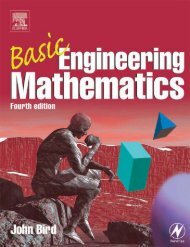How-to-Write-a-Better-Thesis
Create successful ePaper yourself
Turn your PDF publications into a flip-book with our unique Google optimized e-Paper software.
Chapter 2<br />
<strong>Thesis</strong> Structure<br />
Karen was undertaking a PhD in engineering <strong>to</strong> investigate whether a new type of<br />
plastic was safe <strong>to</strong> use as cookware. When she started her lab work, she decided<br />
<strong>to</strong> begin writing her thesis, but despite her determination she was having trouble. I<br />
knew Karen well, and she was a very good student who had been interested in new<br />
plastics ever since her undergraduate studies several years ago.<br />
Karen decided that the first thing <strong>to</strong> do was <strong>to</strong> write a review of the literature. I <strong>to</strong>ld<br />
her <strong>to</strong> send me an outline of how she expected <strong>to</strong> tackle it soon—but after two weeks<br />
nothing had yet appeared. I asked her what the problem was. ‘No problem’, she replied,<br />
‘I just have a lot more papers <strong>to</strong> read. When I’ve read and summarized them,<br />
then I can start writing’. I reminded her that she’d <strong>to</strong>ld me a similar s<strong>to</strong>ry a few weeks<br />
earlier: after reading a few more articles, she would indeed start writing. While reading<br />
those, however, she’d turned up several more. And then there was the material<br />
that she had listed <strong>to</strong> read in the future. Karen then showed me several summaries,<br />
and each was separate. At that point, I concluded that she was never going <strong>to</strong> start.<br />
Seemingly, Karen had <strong>to</strong>ld herself that finding ‘a few more papers’ was the reason<br />
for her continued delay, but from experience, I realized that her problem lay deeper.<br />
Why We Have Trouble with New Tasks<br />
When we start a new project, figuring out how <strong>to</strong> proceed is easy if the project is<br />
similar <strong>to</strong> things we’ve done in the past. Building a bookcase, say, is not a big challenge<br />
for someone who has already made a kitchen cupboard. But an entirely new<br />
task is another matter: every aspect is unfamiliar, and it is not obvious how <strong>to</strong> begin<br />
or what the obstacles will be. We may not even know how <strong>to</strong> think about the problem.<br />
Imagine the state of mind of someone whose practical experience is limited<br />
<strong>to</strong> building kitchen cupboards, but who is asked <strong>to</strong> build a three-bedroom house.<br />
There will be many questions: Where <strong>to</strong> buy the materials? What materials? What<br />
<strong>to</strong>ols are needed? Will the walls be strong enough? <strong>How</strong> <strong>to</strong> arrange for plumbers<br />
and plasterers? What is the first step? The task of starting <strong>to</strong> write a thesis may be<br />
equally as challenging.<br />
D. Evans et al., <strong>How</strong> <strong>to</strong> <strong>Write</strong> a <strong>Better</strong> <strong>Thesis</strong>, DOI 10.1007/978-3-319-04286-2_2,<br />
© Springer International Publishing Switzerland 2014<br />
9


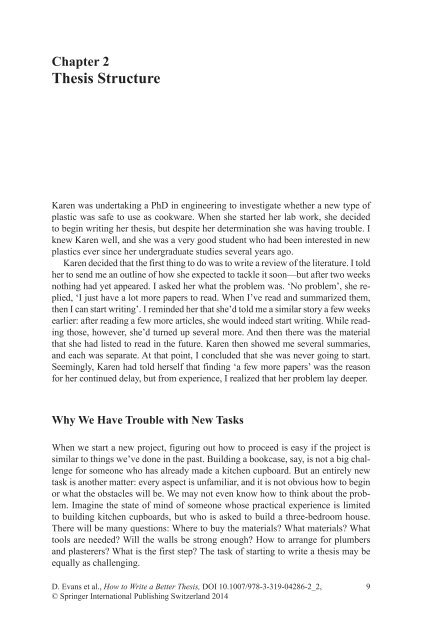

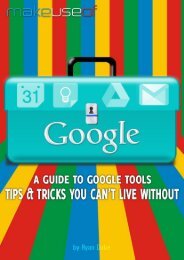

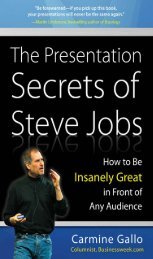



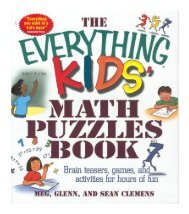



![[Lonely Planet] Sri Lanka](https://img.yumpu.com/59845622/1/169x260/lonely-planet-sri-lanka.jpg?quality=85)


